He was aged just ten when he was picked to play the lead role in the film The Lone Wolf. At the age of 18 he realised that there was no other way for him than the one that placed him in front of the camera and on stage. He worked with, and learned from, the best actors, so he didn’t even enrol in the academy of dramatic arts. He performed almost 70 roles in film and TV series, receiving the most significant accolades. Due to his minimalist acting style, he became the acting ideal of Emir Kusturica, and one of the favourite, most beloved characters among the public. His official biography states that he is Serbo-Croatian, but he would prefer to say of himself that he is a Yugoslav actor
Child actors find it hardest to survive on film and to endure. Slavko Štimac turned 60 this October, after having spent almost half a century in front of the camera. While he rarely appears on the theatre stage, when he does so he is brilliant and convincing:
“It seems to me like someone deliberately created a division between film and theatre actors. The theatre wants to lead you in a manner that the camera can’t stand, and television wants that too, but everything boils down to the fact that you either have charisma or you don’t. The same goes for both theatre and film.”
“I watched Al Pacino and Kevin Spacey in the theatre, and realised that they are just as strong on stage as they are in films. An actor is an actor on the stage, and where that stage is, what it is made of, what kind of stage it is does not change the essence of his greatness and strength.”
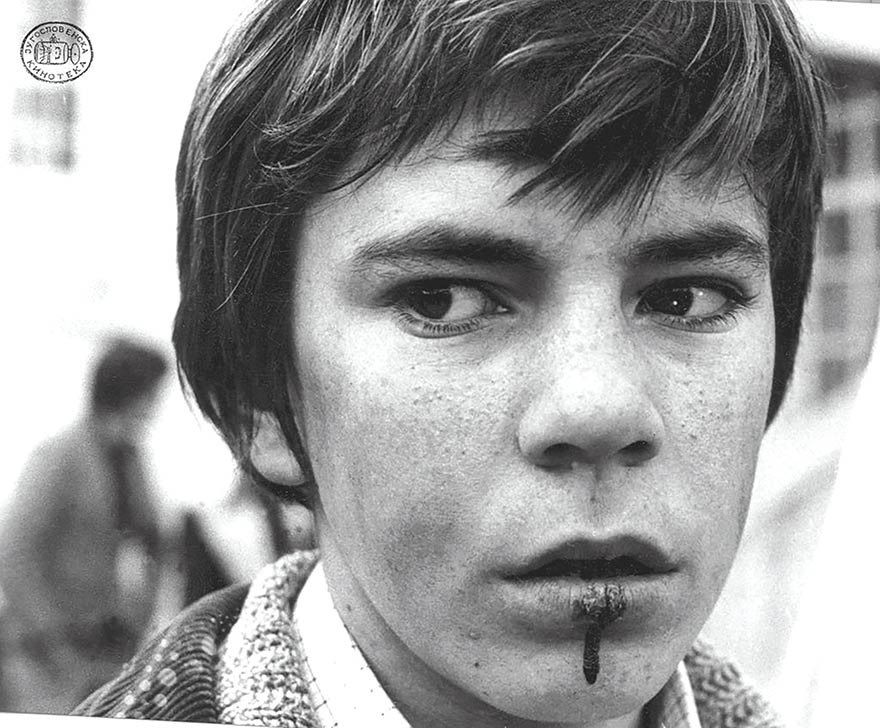
This actor endures and preserves himself from the public eye. In the harsh world of film, he is a rare favourite among protagonists that directors desire and praise, and a safe partner that colleagues look forward to working with. It was a long time ago that Neda Arnerić testified to me how much pleasure she got from working with him for the film Who’s Singin’ Over There, while Goran Paskaljević said that he couldn’t have found a better hero than Slavko Štimac for the character of Petar Cvetković in the film The Elusive Summer of ‘68. Both Neda and Goran departed to the heavenly world of eternal film during the last year.
In the career of Slavko Štimac, everything began in 1971, when Maja Gluščević, the wife of director Obrad Gluščević, came to Slavko’s school class and asked the teacher if there was a boy who recited well and would be good for the lead role in a children’s film. The teacher chose a few, but Maja liked little Slavko the most. She was delighted with how he recited, and she ran back to her husband Obrad to tell him that she had the main actor. That is how Slavko secured the status of a child actor with his very first role in the film The Lone Wolf.
This is how he recalls that time:
“The team from the film arrived in Lika, in my hometown of Perušić. They chose boys from the schools and there were many of us at the audition. Director Obrad Gluščević chose me in particular. After that roles came one after another. I didn’t have time to think about whether or not I even wanted to pursue a career in acting, rather I just accepted all the challenges and roles. My only regret today is that I grew up in front of cameras. It was because of acting that I didn’t have time to play with other children. I had my worst traumas because of school, because I was always a good student, and since I filmed a lot I was afraid that I would slacken off at school. I studied during breaks from filming, sometimes at night. A teacher came to my sets to help me make up for the material I’d missed, so I completed primary school with great success. Only I didn’t enrol in acting studies after high school because I was already going from film to film.”
Today I don’t think it’s so bad to gain fame early, if you have to, when you’re still a child. Because I didn’t prepare for something like that, I didn’t dream about it. It simply happened, they found me
Slavko’s father, Pava, dealt with construction and worked in Germany for a while. They had an estate. His mother was a housewife who took care of the father and three sons. If a little one would sometimes get carried, she was always there to flap his wings and bring him back down to the ground. That’s why, despite his popularity, Slavko never acted like a star. He believed that would be degrading. His parents didn’t visit him during filming. His father died early, he lost his mother in 2010 and was left without his eldest brother last year. He regularly sees his other brother, who lives in Zagreb, and it’s easy for him to get in his car and visit his closest family:
“We have good relations; we’re close. My father died when I was 23 or 24. He was ill with cancer. He suffered a lot during his final years. It seems to me that there was always a tacit promise between us that we would one day sit down together and talk well. We didn’t get to that, and that’s it. That stayed with me as something… When he was dying, I was beside him, but somehow I think that he wanted to tell me something. I never found out what my father thought about what I do for a living.”
The general public fell in love with Slavko in the series The Farm in the Small Marsh. Screenwriter Arsen Diklić was waiting for the series to be shot by Branko Bauer, a renowned Yugoslav director who Slavko remembers as a man and an artist of large formats:
“We spent a year working on that series and film, and Branko Bauer is very important in my life. He in some way laid the foundations of my craft, although throughout my entire life I learned the craft best from other actors, like Cica Perović and Slobodan Aligrudić.
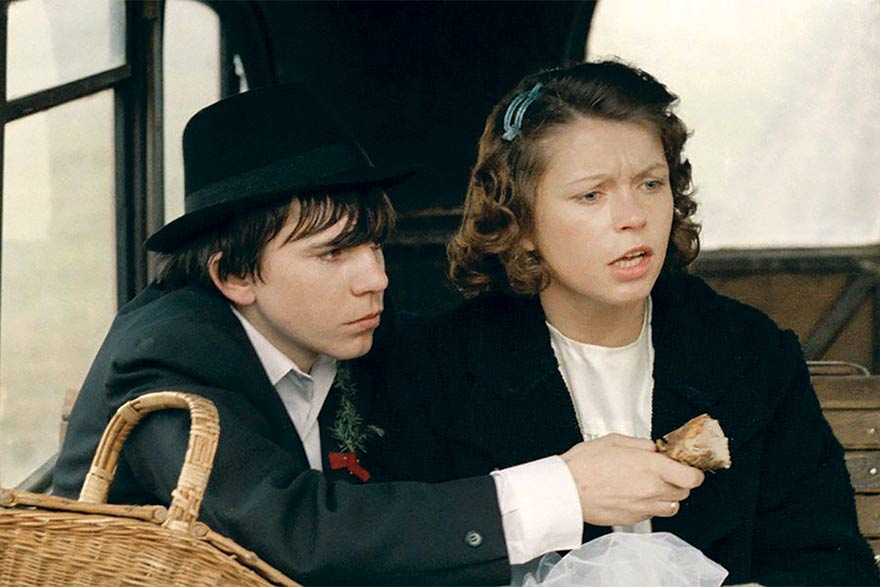
“I remember Slobodan ‘Cica’ Perović as a calm and somewhat introverted man, although they are nonetheless the memories of a child. He was very attentive towards me and I can’t remember a single awkward situation while we were filming. Paja Vuisić also seemed to me like an introvert, a closed man. Admittedly, I was a child and I couldn’t expect them to play with me.”
“With Slobodan Aligrudić the situation was completely different. When we made the film Do You Remember Dolly Bell, I was older and he was a goatherder, infinitely charming, who could talk nicely and joke around, who was imaginative and full of energy. We worked wonderfully together, had an outstanding relationship, one of the best in my work. Just like father and son at their best.”
I went through life trying not to hurt anyone else. The older I get, the more I believe that the most important thing is to have a clear conscience, to fall asleep easily. Quite simply, to live normally
And great actor Slobodan Cica Perović said of Slavko after filming the series The Farm in the Small Marsh: “The boy is unbelievable. It’s very difficult to work with children, I know that from experience, but with Slavko it is a real song. He doesn’t even know how to act. He’s just as natural in front of the camera as he is in life”.
That series brought Slavko great fame: “You can’t imagine what that looked like. In the mid-1970s, you had only two TV channels in Yugoslavia, and the whole country – like it or not – would sit and watch The Farm in the Small Marsh on Sunday evenings at eight o’clock. Every Yugoslav has watched at least one episode. There was literally no place where I could appear without being noticed. Everyone knows you, the entire country. And I wasn’t even fifteen years old. And I was really trying to remain normal. Today, for example, I don’t think it’s so bad to gain fame early, if you have to, when you’re still a child. Because I didn’t prepare for something like that, I didn’t dream about it. It simply happened, they found me. In that sense, I never made a special effort to get a job, never went behind someone else’s back or harmed anyone. I went through life trying not to hurt anyone else. The older I get, the more I believe that the most important thing is to have a clear conscience, to fall asleep easily. Quite simply, to live normally.”
He completed primary school in his hometown of Perušić:
“The first film I watched, and remembered, and Perušić, of course, was called The Man Who Shot Liberty Valance. It starred John Wayne and Lee Marvin. Among us kids, cowboys and films about Tarzan were popular. As one friend of mine says, we grew up under the direct influence of American propaganda. At the age of 11-12, I listened to Jimi Hendrix, so let someone explain today how he got to Lika!”
He enrolled in high school in Gospić, but at the age of 16 came to Belgrade and has remained here. He was 15 years old when Sam Peckinpah was shooting his film Cross of Iron in Istria and Slovenia, and someone told him that he could entrust one of the roles to a boy who had already performed in our Yugoslav films.
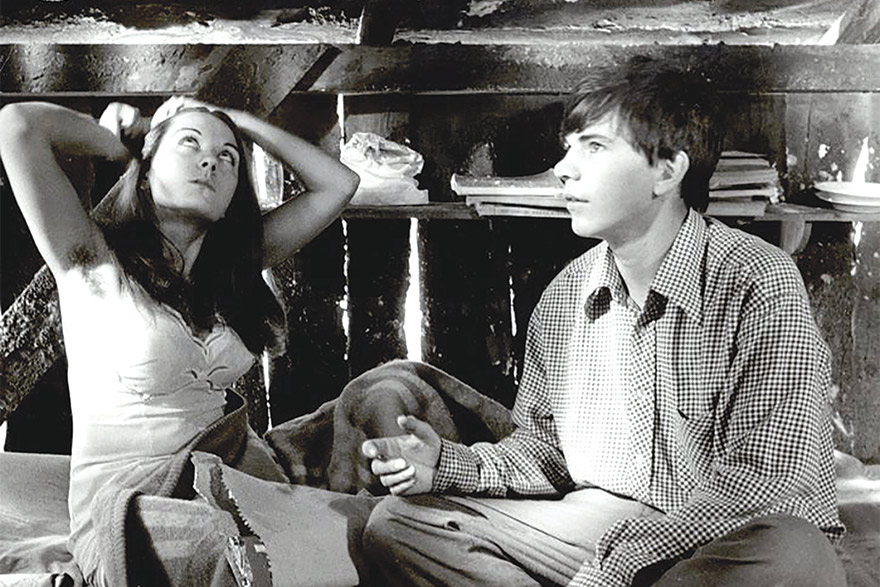
This is how the famous director called Slavko:
“It was planned for the filming not to last long – just a day or two – but Peckingpah liked it and decided to continue. He extended my role. When I’m asked how I experienced the great Sam Peckinpah, I always answer that I was just 15 when I made a film with him. I’d already watched some of his films, but not The Wild Bunch. When you’re 15, you can’t consider the greatness of Sam Peckinpah. I simply did what he told me I should. And that is all.”
He was then chosen by Goran Marković for his debut film Special Education. Slavko was still just 15 when filming began, and he turned 16 during filming. It was on 25th May 1977 that the most prestigious film magazine, Variety, published a light-hearted critique of the film, and Štimac in particular:
“Special education provides us with numerous opportunities to gain insight into the lives of juvenile offenders and their problems, somewhat in the manner of Buñuel’s The Young and The Damned and De Sica’s Shoeshine.
“Slavko Štimac, as a juvenile delinquent who steals and acquires his special education in order to survive and live, represents a real acting discovery. (he can also be seen in Sam Pekinpah’s Cross of Iron)…”
When my father was dying, I was beside him, but somehow I think that he wanted to tell me something. I never found out what my father thought about what I do
When Emir Kusturica’s debut film, Do You Remember Dolly Bell, appeared in cinemas in 1981, it was the first meeting between the future great director and already renowned actor. Štimac remembers the persistence of the novice director in enduring with what he’d imagined, which he has remained consistent in to this day:
“We enjoyed ourselves during shooting, but none of us even dreamt that the audience would receive this film so fantastically. I was just aware that I’d played a good role. But a film isn’t one actor, nor three of them. A film is – everything together… In Do you remember Dolly Bell, in the way of acting, in the relationship with the film’s father, Slobodan Aligrudić, I had my father in my head, my relationship with him… But Aligrudić himself was very inspiring. After all, contact with a partner is half the battle.”
In this subtle story from the Sarajevo Bazaar, about his first love and growing up in Sarajevo during the 1960s, Štimac brilliantly portrayed the young Dino, the hero of this anthology film. Director Kusturica and actor Štimac got together again for the films Underground and Life is a Miracle. The black comedy Underground was awarded by the jury of the Cannes Film Festival in 1995 as an anti-war film, awarding it the famous Palme d’Or.
The filming of Underground lasted three calendar years. For the first six months the film was shot in Prague, then in Belgrade, and subsequently in Bulgaria. It was the largest and most expensive film in Europe that year. Slavko also had a monkey as a partner:
“Those were really awful years. From Prague I monitored what was happening in the former Yugoslavia. I was ashamed; I was desperate because my country was falling apart in that way. I don’t know who said it, but I was really withdrawn and suffered like an animal. One fails to find solace and clings to the smallest straw… During those years most people were gripped by insane nationalist hysteria, especially in the beginning. They all somehow stuck to their own side. But I wondered what my side was. Although I knew very well that my side was in a large minority. After all, normal people are always a minority during such times. Family, a few close friends and… The war was great nastiness. A man is suddenly confronted by horror…
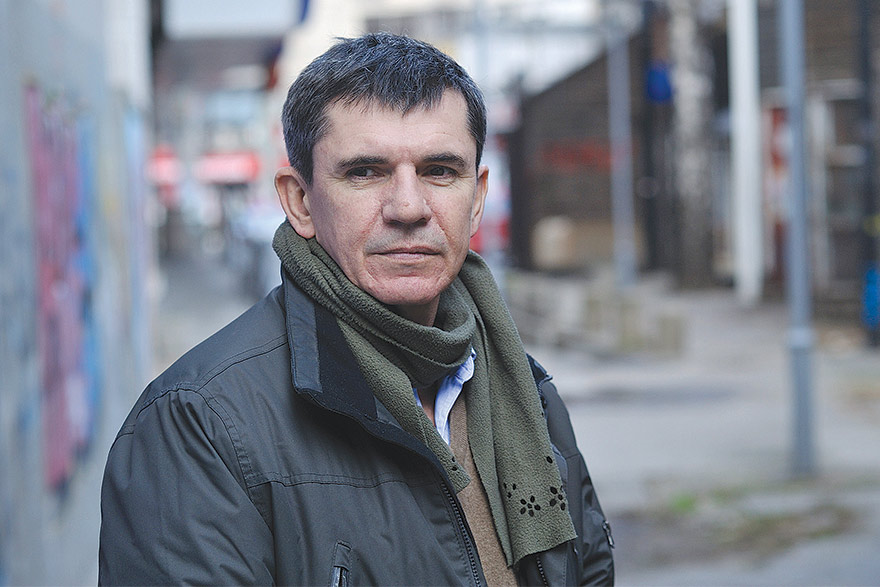
“Towards the end of Underground there’s a scene that I’m always happy to watch. And it happened by accident. Sometime around two or three o’clock in the morning, in some Bulgarian tunnels, the monkey and I met again; we finally found each other. He approached me and hugged me, somehow sincerely, from the heart. Incredible! I remember that the late Vilko Filač, as soon as he finished filming, showed me how he himself got goosebumps. It was a touching scene. I guess I carried some emotion inside me that the monkey recognised, received, and hugged me like… ”
Immediately after the completion of Underground in 1996, Slavko went to America. Not as an emigrant, but for family reasons:
“My wife lived in New York, so I went.
I actually know from experience that changing your place of residence means nothing. It doesn’t help… Quite simply, a person can’t get out of their own skin. In New York I did a little work around film, but mostly some other things. For example, I got a job at the National Library, in the department for Slavic languages. I was helped by my knowledge of the culture of the Slavic peoples, knowledge of Cyrillic and Latin scripts. I’m not sure I missed acting much during those years. I realised on time that not everything in life revolves around acting, there are other things. Admittedly, from time to time I used to walk down the street and see people shooting a film, pulling lights; something would always tremble in me. Something would catch me … I don’t know what to call it. Yearning, nostalgia?”
He returned from America in 2002, only to shoot Life is a Miracle with Kusturica.
The Yugoslav film in which this actor also has a significant share also belonged to the family of world film, primarily European film:
“We had a solid base of film workers, a beautiful country, beautiful nature. Yugoslavia had architecture ranging from Oriental and Austro-Hungarian, to that which belongs to the Mediterranean. What a wealth that was! We were able to provide foreigners with great film shooting services.
“On one occasion, quite by accident, I met Miloš Forman. My friend, a lady journalist, went to meet Forman for an interview, and she was terribly nervous, so she took me to make it easier for her. And so the two of us chatted a bit. I was especially glad when Foreman, who had just filmed Hair, spoke most beautifully and with great respect about his friend Aleksandar Saša Petrović. I experienced that as another of the many testimonies to the greatness of the former Yugoslav film.”
We had a solid base of film workers, a beautiful country, beautiful nature. Yugoslavia had architecture ranging from Oriental and Austro-Hungarian, to that which belongs to the Mediterranean. What a wealth that was! We were able to provide foreigners with great film shooting services
If there is a character synonymous with Slavko Štimac, then it is Dobrica. Dobrica with whom you can’t be angry, because he doesn’t want to talk about his adult son, an economist, and his wife, because he has protected and preserved his private life. And those who’ve spent at least a moment with him will tell you that Dobrica (Goodness) is actually his middle name. That’s also how director Srđa Penezić decided to entrust him with the title role in the film Name: Dobrica, Surname: Unknown.
The film begins with two elderly people finding a baby in a basket beside a bakery. They take him and give him the name Dobrica, because he is in good spirits and always smiling… But they don’t know who he is and where he’s come from. And that Dobrica is full of good will, that’s how he was born. Whatever happens in his life, good or bad, he accepts with a smile. But nevertheless, on the other hand, he is intelligent and very aware of everything happening around him. Slavko talks about that Dobrica from the film as follows:
“This film shows how being good doesn’t have to mean that, according to the folk saying, good and crazy are born as brothers. A good man cannot be crazy. Madness is a disease. The world is full of good people who only show their true nature under certain circumstances. It all depends on how we approach them. Because people change when they’re alongside good people. Goodness lurks deep in every man…
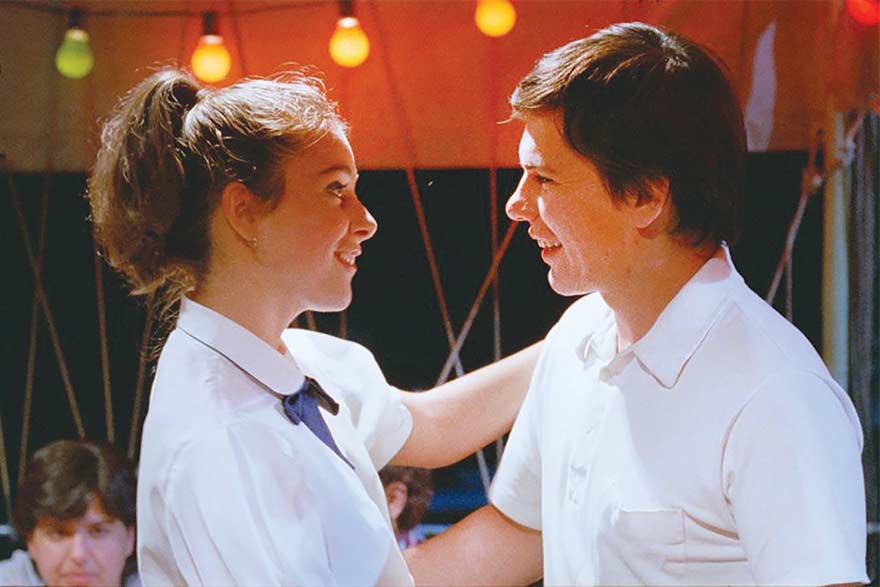
“Difficult stories have always existed and there have always been difficult times. Now we have leapt a little into harsh capitalism, so it is more pronounced, but there are definitely people like Dobrica. Goodness is love, love is creation, and hatred is destruction. We exist thanks to love, and that is goodness. If people like Dobrica didn’t exist, this world would fall apart and we definitely wouldn’t have a chance.”
His official biography states that Slavko Štimac is a Serbo-Croatian actor:
“What can I do? I would call myself a Yugoslav actor, but… We are witnesses to the chopping up and creation of states and mini states that are still going on; we are witnesses of primitive chauvinism and you can’t do anything to those who dictate that. They do it on their own, they push, some do one thing, others do another…
“I was brought up as a man, first and foremost, and I was born and raised in Yugoslavia. It is very toxic to think about who you are, what you are, how you are determined by your place of birth.”
We’ll conclude this story by summarising the film journey of this actor: Slavko performed nearly 70 roles in films and TV series, receiving the most significant awards – Aleksandar Lifka, Živojin Žika Pavlović, the Golden Mimosa, the Heart of Sarajevo… until the latest, an Honorary Ernest. He was an acting discovery, he was 17 years old when he received his first award, which was the then so significant Seven Secretaries of SKOJ, as its youngest recipient. He became the acting ideal of Emir Kusturica, thanks to his minimalist acting, and was one of the public’s favourite, most beloved actors from the world of former Yugoslav film.